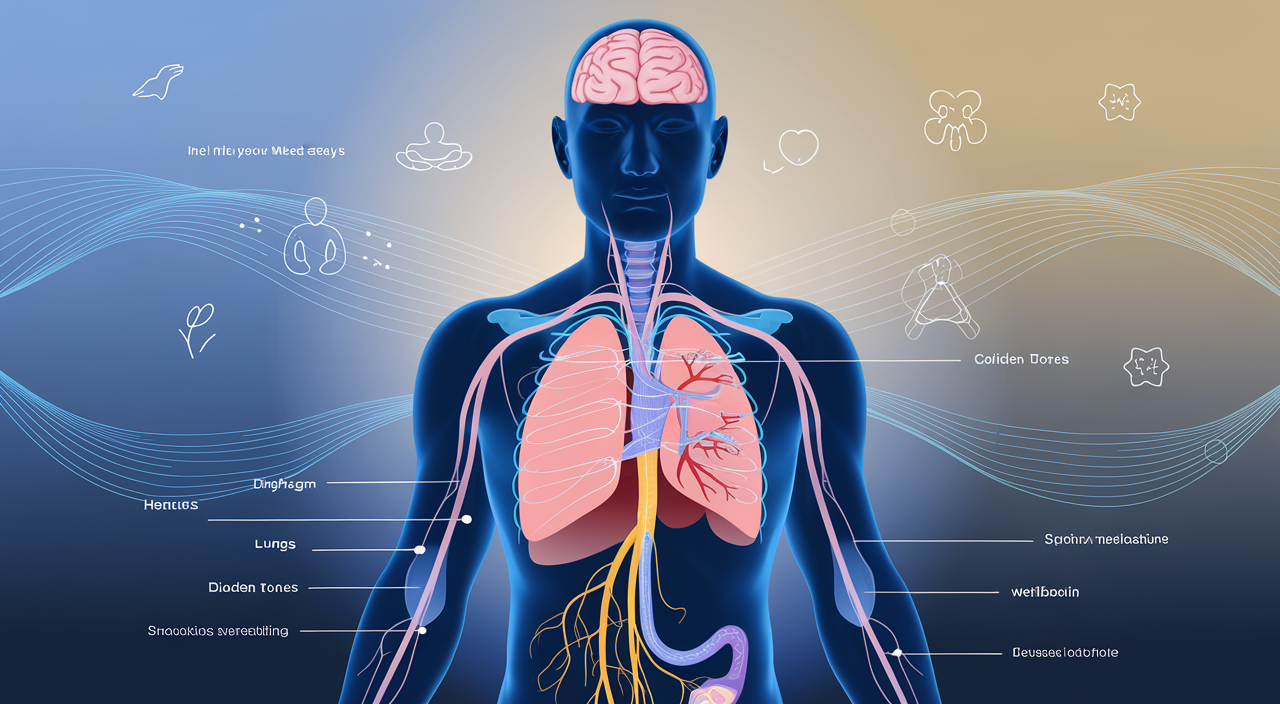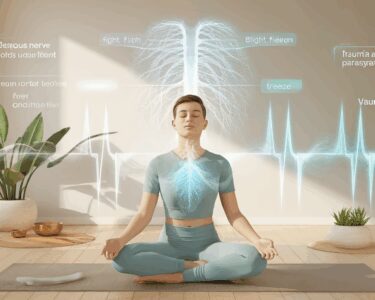Vagus nerve therapy for anxiety: The vagus nerve functions as the body’s relaxation superhighway, linking the brain to major organs and managing anxiety through the parasympathetic nervous system. By using specific stimulation techniques, I can activate this powerful nerve to build vagal tone—creating a natural, internal system that fights stress responses and improves emotional regulation.
Key Takeaways
- The vagus nerve regulates vital functions including heart rate, breathing patterns, digestive processes, and inflammation levels throughout the body.
- Higher vagal tone correlates with better anxiety management, improved sleep quality, enhanced emotional regulation, and stronger stress resilience.
- Heart Rate Variability (HRV) serves as a reliable measurement of vagal function, with lower measurements typically found in people with anxiety disorders.
- Effective vagus nerve stimulation techniques include slow rhythmic breathing (5–7 breaths per minute), cold exposure, vocal exercises, and daily meditation.
- The vagus nerve influences crucial mood-regulating neurotransmitters and helps reduce inflammatory responses that can trigger or worsen anxiety symptoms.
Your Essential Guide to Understanding and Activating the Vagus Nerve
How Vagus Nerve Therapy for Anxiety Works in Your Body
The vagus nerve serves as your body’s superhighway for relaxation, stretching from your brainstem down through your torso. As your longest cranial nerve, it creates a direct communication channel between your brain and major organs, playing a crucial role in managing anxiety and stress responses.
I’ve found that understanding how vagus nerve therapy for anxiety functions starts with recognizing its role in the parasympathetic nervous system — your body’s natural relaxation response. Like a skilled conductor, it orchestrates your internal organs, controlling everything from your heartbeat to your breathing rhythm.
Here’s what makes the vagus nerve so vital for anxiety management:
- Regulates heart rate and blood pressure
- Controls breathing patterns and depth
- Manages digestive function and gut health
- Reduces inflammation throughout the body
- Influences emotional regulation and social connection
Measuring and Improving Your Vagal Tone
Just as you’d strengthen a muscle through cold exposure therapy, your vagal tone can be enhanced through specific practices. Better vagal tone means improved stress resilience and anxiety management.
Vagus nerve therapy for anxiety becomes more effective when combined with practices like sound therapy, which can stimulate the nerve and promote relaxation. I’ve discovered that monitoring your Heart Rate Variability (HRV) provides a reliable indicator of how well your vagus nerve functions.
Your vagal tone directly impacts your ability to bounce back from stress. Higher vagal tone correlates with:
- Enhanced emotional regulation
- Better sleep quality
- Improved digestion
- Reduced inflammation
- Stronger immune response
- Greater stress resilience
The vagus nerve’s interoception capabilities — your ability to sense internal bodily signals — play a key role in managing anxiety. This internal awareness helps you recognize and respond to stress signals before they escalate.
Through regular stimulation and conscious activation of the vagus nerve, you can strengthen this natural anxiety-fighting system. Think of it as building your body’s internal stress-management muscle, creating a more resilient response to life’s challenges.
How Your Vagus Nerve Impacts Anxiety and Stress Response
The Science Behind Vagus Nerve Therapy for Anxiety
Your vagal tone plays a crucial role in managing anxiety and stress responses. I’ve found that understanding this connection helps create better strategies for anxiety management. Low vagal tone directly affects your ability to regulate emotions and handle stress effectively.
The relationship between your vagus nerve and anxiety creates a fascinating feedback loop. When you’re anxious, your vagal tone decreases, which can make anxiety symptoms worse. This cycle can be broken through targeted vagus nerve therapy for anxiety techniques, similar to how cold exposure therapy reduces stress responses in the body.
Heart Rate Variability (HRV) serves as a key indicator of vagal function. Research consistently shows that people with anxiety disorders typically have lower HRV measurements, suggesting reduced vagal tone. This biological marker helps explain why vagus nerve therapy for anxiety has gained significant attention in treatment approaches.
Biological Mechanisms and Neural Chemistry
Your vagus nerve influences crucial neurotransmitters that regulate mood and anxiety:
- GABA production and regulation
- Acetylcholine release and balance
- Inflammatory response management
- Stress hormone control
The vagus nerve’s impact on inflammation is particularly noteworthy. Chronic inflammation can trigger or worsen anxiety symptoms, but proper vagal stimulation helps reduce inflammatory markers. This anti-inflammatory effect works similarly to how sound therapy creates healing vibrations throughout your body.
Chronic stress poses a significant challenge to vagal nerve function. When you’re constantly stressed, your vagus nerve activity decreases, making it harder for your body to maintain calm. This biological response explains why vagus nerve therapy for anxiety often focuses on stress-reduction techniques.
The vagus nerve’s influence on neurotransmitter production affects your overall mental state. By stimulating this nerve, you can enhance the production of calming chemicals while reducing stress hormones. This dual action makes vagal stimulation a powerful tool for anxiety management.
Understanding these biological connections helps explain why proper vagal tone is essential for mental health. By targeting the vagus nerve through specific therapeutic approaches, I’ve seen how it’s possible to break the cycle of anxiety and improve emotional regulation naturally.
Science-Backed Techniques to Stimulate Your Vagus Nerve
Essential Breathing Methods for Vagus Nerve Therapy for Anxiety
Slow, rhythmic breathing serves as a foundational technique for vagus nerve therapy for anxiety. I’ve found that maintaining 5–7 breaths per minute creates optimal stimulation – this means extending each breath cycle to about 10 seconds. Diaphragmatic breathing amplifies these benefits by engaging your belly rather than chest muscles.
Here’s how to perform key breathing techniques effectively:
- Box Breathing: Inhale for 4 counts, hold for 4, exhale for 4, hold for 4
- 4-7-8 Method: Inhale for 4, hold for 7, exhale slowly for 8 counts
- Diaphragmatic Breathing: Place hand on belly, breathe to expand it, exhale twice as long as inhale
Physical and Lifestyle Approaches to Vagal Stimulation
Cold exposure, like taking a cold plunge to reduce stress, triggers your mammalian diving reflex, immediately activating the vagus nerve. Vocal exercises offer another direct path – humming, singing, or gargling stimulate vagal nerve endings in your throat.
Daily meditation practice strengthens vagal tone over time. I’ve seen particular success with Loving-Kindness Meditation, which combines emotional regulation with vagus nerve therapy for anxiety relief. Adding sound therapy for deep relaxation can enhance these effects further.
Your gut health plays a crucial role in vagal function through the gut-brain axis. Including fermented foods and maintaining regular exercise habits supports this connection. Social interactions, especially positive ones, naturally stimulate the vagus nerve through facial expressions and voice modulation.
I recommend starting with 5–10 minutes of practice daily, focusing on one technique before adding others. While these methods show promising results, they shouldn’t replace professional medical advice or prescribed treatments for anxiety disorders. By combining various approaches – like cold exposure with breathing exercises – you’ll create a more effective vagal stimulation routine.
Some people find that stimulating this important nerve can help regulate stress responses, as the vagus nerve’s role in calming the body is crucial to reducing anxiety symptoms.
Sources:
Frontiers in Psychiatry: Vagus Nerve Stimulation in Psychiatry: A Systematic Review of the Available Evidence
Journal of Clinical Medicine: Heart Rate Variability as a Potential Biomarker for Anxiety Disorders: A Systematic Review
Psychological Science: Open Hearts Build Lives: Positive Emotions, Induced Through Loving-Kindness Meditation, Build Consequential Personal Resources
Frontiers in Human Neuroscience: How Breath-Control Can Change Your Life: A Systematic Review on Psycho-Physiological Correlates of Slow Breathing
Clinical Science: Vagal activity is quadratically related to major depression and symptoms of anxiety
Brain, Behavior, and Immunity: The vagus nerve and the inflammatory reflex – linking immunity and metabolism
International Journal of Psychophysiology: The polyvagal theory: Neurophysiological foundations of emotions, attachment, communication, and self-regulation








